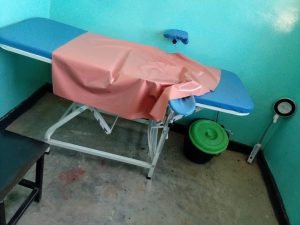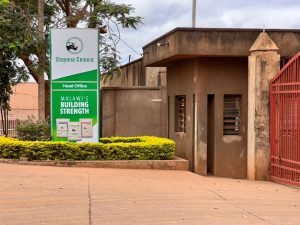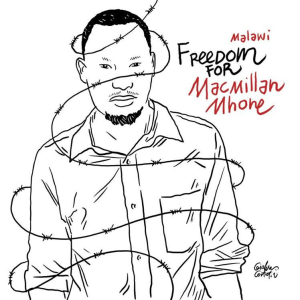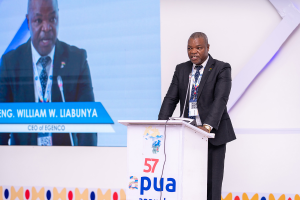CROSS-JURISDICTION CONTROVERSY: MAGISTRATE’S AUTHORITY QUESTIONED IN PSI FRAUD CASE

A Mixture of villagers, villageheads and Group Village Headman Mzinganyama Pose for a Picture after talking to PIJ
Judiciary to Closely Monitor Proceedings
BY GREGORY GONDWE
In a twist of legal proceedings, Senior Resident Magistrate Lawrence Chilima of Midima in Limbe, Blantyre, is embroiled in a controversial case involving allegations of an expansive fraud scheme against Family Health Services (FHS), formerly known as Population Services International (PSI).
The case, which straddles both civil and criminal jurisdictions, has brought to light a significant issue: the extent of judicial authority across different legal domains.
At the core of the controversy is Magistrate Chilima’s dual role in overseeing a civil compensation claim and a related criminal prosecution linked to the fraudulent creation of health passports and exploitation of minors in Phalombe and Mulanje districts. The situation intensified with the arrest of Anthony Chipolopolo, charged with fabricating or signing false documents, namely 39 Malawi Health Passports.
Senior Resident Magistrate Chilima is currently presiding over three significant civil cases. On August 29, 2023, Stella Mkhosa initiated a legal suit against Population Services International (PSI) on behalf of her son, Yusuf Banda, and 21 others, under civil case number 1813 at the Senior Resident Magistrate Court in Midima.
Subsequently, on October 4, 2023, Damson Esimey filed a legal suit at the same court, representing a minor, Enock Kachala, along with 311 others, demanding compensation from PSI. Just two days later, on October 6, Aida Mvula led a group of 25 plaintiffs, including Promise Mauzu, in another lawsuit against PSI.



In a notable development on December 18th, during Bail Cause 1129 of 2023, Magistrate Chilima facilitated Mr. Chipolopolo’s application for release from detention, with or without bail.
This order was dispatched to both Blantyre and Phalombe Police Stations. However, the legal landscape shifted when the release order was presented before the Second Grade Magistrate Court at Phalombe in criminal case number 459 of 2023.
Despite the consistency of the alleged crime, the order was rebuffed, citing jurisdictional conflicts.



The unfolding scenario raises critical questions about the boundaries of a magistrate’s power when handling cases that cut across civil and criminal lines.
As the legal community delves deeper into this complex issue, the focus sharpens not only on Magistrate Chilima’s decision-making but also on the broader implications for judicial conduct in multifaceted legal matters.
The intrigue continues as all eyes are on the legal system, seeking a resolution that ensures both judicial propriety and the rule of law are maintained.
Judicial Decision’s Implications on People
In the backdrop of the picturesque yet troubled Phalombe and Mulanje districts, the community finds itself enmeshed in a scandal that has far-reaching implications, extending from the village dirt roads to the hallowed halls of justice.
This case, a manifestation of alleged deceit and manipulation, revolves around the Voluntary Medical Male Circumcision (VMMC) program.
The Platform for Investigative Journalism (PIJ) has illuminated the contours of this scandal, uncovering the involvement of unsuspecting villagers and village headmen led astray by a network of nefarious individuals. The community’s trust has been betrayed, turning what should have been a health benefit into a conduit for deception.
The decisions made in Chilima’s courtroom are not merely procedural; they resonate through the communities of Phalombe and Mulanje, where the repercussions of fraud and deceit have left a deep imprint.
A legal expert who opted for anonymity told PIJ that the intertwining of this legal drama with the lives of the affected villagers serves as a poignant reminder of the far-reaching consequences of judicial decisions.
“As the magistrate deliberates over the intricacies of jurisdiction, the people of Phalombe and Mulanje districts await justice, hoping for a resolution that will not only address their immediate grievances but also restore their faith in the systems meant to protect them,” the lawyer who is in private practice said.
He said the story of the alleged deceit that began with a health initiative has now evolved into a critical test of legal integrity and ethical governance.
The Arrest of Lawyer and Others
In a significant development to the unfolding scandal, National Police spokesperson Peter Kalaya informed PIJ of the arrest of six individuals, including lawyer Dalitso Chimbe of Dawn Patrick’s Attorneys, as previously reported.
These arrests are in connection with an alleged fraudulent lawsuit involving FHS.
The case centres around residents from Phalombe and Mulanje who were unwittingly listed as plaintiffs seeking compensation for circumcisions allegedly conducted by FHS without proper guardian consent. The arrest of Chimbe and others marks a critical turn in the investigation, underscoring the serious legal and ethical ramifications of the alleged fraud.
Kalaya revealed that the arrests are a direct result of meticulous investigations by the Malawi Police Service’s Fiscal and Fraud Section.
Detailing the timeline of the crackdown, Kalaya stated, “The suspects were apprehended between December 12 and 15, 2023, following the complaint lodged by Family Health Services. Our investigation uncovered certain criminal activities that necessitated these arrests. We anticipate further actions as the investigation continues.”
Offences Committed
The National Police spokesperson said the accused include the 29-year-old lawyer Chimbe; 58-year-old Anthony Chipolopolo, a clinician operating privately in Ndirande, Blantyre; 44-year-old Peter Mathewe, a health surveillance assistant (HSA) from Phalombe District Hospital stationed at Migowi Health Centre; and 53-year-old Rose Howse, who acted as an agent in the scheme.
Kalaya outlined the array of charges facing the suspects, reflecting the serious nature of the alleged crimes.
They are accused of conspiracy to defraud, an offence under Section 323 of the Penal Code, and intent to defraud, as per Section 354. Additionally, they face charges of abuse of office (Section 95), false pretence (Section 319A), making a false document (Section 353), and procuring the execution of documents by false pretence (Section 362).
These charges indicate a multifaceted approach by law enforcement to address each aspect of the alleged fraudulent activities thoroughly and ensure justice is served.
In a related development, Mulanje Police initially apprehended two suspects linked to the fraudulent circumcision compensation claims. Vincent Chakhumata Banda, a medical practitioner at the Mulanje district health office, and Justin Iron acting as an agent, faced charges of conspiracy to commit a felony, obtaining money to defraud others, abuse of office, and false pretence.
Kalaya detailed that the duo allegedly conspired to lodge compensation claims on behalf of over 400 male minors from the two districts. These claims asserted that the minors were circumcised between 2021 and 2022 without proper parental consent.
However, Kalaya pointed out discrepancies in the alleged timeline of events.
According to police investigations, FHS suspended its circumcision campaign and services in Phalombe and Mulanje districts in October 2019 due to the COVID-19 pandemic and did not resume until October 2022.
Furthermore, upon reviewing the list of supposed minors provided for compensation claims, authorities found significant inconsistencies.
“Many individuals claimed to be minors are, in fact, adults over 30, some of whom are married with their spouses listed as guardians,” Kalaya stated.
He also noted that other adults included in the lawsuit were circumcised as recently as 2023, well after the alleged period of unauthorized procedures, casting further doubt on the legitimacy of the claims.
Kalaya disclosed further startling details about the fraudulent circumcision compensation claims where he said some listed claimants purporting to represent minors are, in fact, representing non-existent children. Moreover, FHS, does not employ health passports for recording circumcision data.
He shed light on the operations of one of the suspects, Mathewe, who allegedly traversed villages in Phalombe, collecting names and national identity cards (IDs) of purported male minors from their supposed parents and guardians.
“Mathewe then relayed this collected data to Rose Howse through both WhatsApp and physical delivery methods,” Kalaya stated.
The National Police Spokesperson differs from his Phalombe colleague regarding Anthony Chipolopolo’s involvement, as Kalaya disclosed that he procured over 150 health passport books, falsely recording and signing as if he had performed the circumcisions, and charged K1,000 for each booklet and recording.
“Rose Howse then coordinated with others, including an individual still at large, to further collect names in villages, also involving Chipolopolo in creating the fraudulent health passport books,” he added.
Kalaya highlighted the role of the fourth suspect, Dalitso Chimbe, who allegedly discussed the execution plan with Howse.
“Without due diligence, Chimbe initiated lawsuits against FHS using these false claims,” Kalaya asserted.
Police are looking for the dethroned Group Village Headman Mathewe, who is now on the run.
Judiciary in a Conundrum

Kondwani Banda, Registrar of Malawi’s High Court and Supreme Court of Appeal, has expressed a conundrum faced by the judiciary following a detailed examination of the related cases.
Banda conveyed his proactive approach to the matter, saying, “Upon receiving the documents, I’ve sought insights from the Chief Resident Magistrate responsible for the Southern Region. He’s committed to providing a comprehensive account after reviewing the pertinent files.”
Banda further highlighted the judiciary’s cautious approach given the ongoing nature of the cases.
He stated they are acutely aware that these are live matters. As such, any commentary on their part regarding their appropriateness, or the converse, could inadvertently prejudice the outcome.
Banda assured that the parties involved are well-versed in the legal and administrative avenues available to them and are aware of the proper channels, both legally and administratively. Should they find something questionable or out of context, they are expected to pursue either of the indicated avenues.
Banda emphasized the judiciary’s commitment to transparency while adhering to legal norms, stating:
“While we remain open to inquiries, our comments are constrained until these matters are conclusively settled in court.”
Magistrate’s Administrate Structure
Detailing the administrative structure of the judiciary, Banda explained the regional arrangement of magistrates and their reporting hierarchy.
“Each judicial region, including the Southern, Eastern, Central, and Northern Regions, is overseen by a Chief Resident Magistrate,” he said. Banda further noted the impending expansion of regions, indicating an evolving judicial landscape.
“As the spokesperson for the judiciary, all communications are directed to me as the registrar. Therefore, when information is sought, I coordinate with the respective CRM to ensure the accuracy and integrity of the details provided,” he said.
Banda explained that their protocol dictates that before they issue any comments on a case, the CRM must review the file firsthand. This process is crucial to ensure that their statements reflect the true proceedings and avoid any misrepresentation of facts.
He further noted the current status of the file in question, stating, “As of now, the CRM has not had access to the file, which is a necessary step in our internal review and response process.”
Banda addressed the complex situation involving cases in Phalombe and Midima. He said the challenge here is the bail granted in Midima and the incident in Phalombe are both live matters.
“Administratively, it’s not feasible for us to intervene at this moment. Doing so could be misconstrued as attempting to influence the decisions of the two courts. Additionally, we adhere strictly to the principle of sub judice, which restrains us from commenting on matters currently before the court,” he insisted.
Banda elaborated on the procedural limitations faced by the Chief Resident Magistrate (CRM) in such cases, stating, “In instances like this, it becomes challenging for the CRM to engage beyond merely reviewing the file. Even after summoning the files, the CRM can only examine and then return them, without making public comments or raising questions.”
He said this restraint is due to the potential perception that the registrar might have a vested interest or be attempting to influence the case, which is never their intention.
“We are merely ensuring that there’s appropriate propriety in handling the cases. Given these considerations, we prefer to let the matters progress under the courts’ purview while closely monitoring them,” he explained.
The registrar detailed the jurisdictional challenge between Chief Resident Magistrates (CRM) and Senior Resident Magistrates (SRM), stating the two share the same jurisdiction, creating a unique challenge.
“While a CRM has the authority to call for files from lower-grade magistrates, make observations, and recommend to the High Court for review, this leeway doesn’t exist between CRMs and SRMs due to their equal jurisdiction. Therefore, legally and administratively, a CRM cannot requisition a file from an SRM,” he added.
Perplexities Surrounding the Granting of Bail
On the perplexities surrounding the granting of bail, Banda elaborated on the nuanced legal debates within the judiciary.
He stated, “In criminal matters, bail is typically granted within the jurisdiction where the incident occurred. For example, if an incident takes place in Blantyre, it becomes problematic for a magistrate in Zomba to grant bail for a case meant to be handled in Blantyre. This could lead to accusations of forum shopping.
He said confusion has come about because the High Court has issued various rulings on this matter, some asserting that a magistrate cannot grant bail for a case already before another court, while others suggest that denying bail for a substantive application before them isn’t warranted.
“Currently, no High Court decision explicitly overrides another, leaving each as a standalone judgment. This ambiguity often poses challenges for magistrates until a definitive reconciliation is made, potentially by the Supreme Court.”
Media Not Restricted
Banda affirmed the judiciary’s commitment to transparency and the rule of law, recognizing the crucial role of the media and legal community in holding the system accountable.
He said scrutiny and exposure of potential flaws or questionable actions are vital as they serve the essence of transparency, integrity, and accountability in the judiciary.
Banda emphasized the media’s role in judicial accountability, stating:
“The media isn’t restrained from shedding light on challenges within the judiciary. Indeed, transparency, integrity, and accountability are paramount. Your reporting helps identify any flaws or questionable practices, prompting necessary corrections. However, such corrections typically occur through the involved parties, such as counsel for the applicant and state prosecution.”
Banda further explained the legal mechanisms for addressing issues. He said legal disputes are often resolved between state advocates and private legal practitioners, potentially escalating to the High Court.
While at the administrative level, they must exercise caution to avoid any perception of prejudice, they recognize the importance of media and public scrutiny in upholding judicial standards.
He said until a matter is concluded in court, they must treat it as an ongoing case, maintaining their commitment to impartiality and due process.
He emphasised the ongoing nature of the legal proceedings and the judiciary’s attentiveness to these matters.
“We are closely monitoring the developments, ensuring that every step taken aligns with our commitment to justice and the principles of our legal system,” Banda stated, assuring the public and involved parties of the judiciary’s dedication to resolving these complex issues with fairness and due diligence.
The Phalombe and Mulanje Connection
In the serene yet now disturbed locales of Phalombe and Mulanje districts, a tale of deceit weaves through the communities, spotlighting a fraudulent scheme against FHS.
PIJ has delved deep into this multifaceted alleged scandal, revealing a deceptive plot hinged on the circumcision program and involving unsuspecting villagers, village headmen, and nefarious individuals.
Village Headmen: Caught in the Crossfire

John Chataika, Village Headman of Namboya, recounts the bewildering turn of events when six individuals from his village, including himself, underwent circumcision at Migowi Health Centre. The plot thickened when dethroned Group Village Headman Matepwe and an unnamed health official concocted a fraudulent compensation claim against PSI, dragging the entire village into the fray.
On December 10th, dethroned Group Village Headman Matepwe convened a meeting with all seven of his village headmen — Namboya, Maluwa, Jamali, Nasingo, and Matepwe himself — to discuss a pressing matter. Notably, three headmen, Jimu, Gona, and Gogodela, were absent.
The agenda was clear: they were informed that a lawyer would be sending money for them and that they should meet at Nansangwi Filling Station in the district to journey to Blantyre and discuss further with the lawyer.
“Come the morning of the 11th, we found that parents of the children who had been circumcised had also gathered,” recounted village headman Namboya, who claimed they were informed by their colleague Village Headman Gona.
In a dramatic twist, a meeting at Nansangwi Filling Station that was called to strategize a visit to a lawyer in Blantyre for supposed compensation erupted into chaos as parents contested the secretive nature and the exclusion of parents in the matter, leading to an unexpected confrontation with the authorities.
“GVH Matepwe insisted the meeting was exclusively for chiefs. However, some parents protested, asserting that since the children were theirs, it was illogical for the village headmen to discuss their children’s compensation without them.”
The GVH Sneaks Out of Police
The situation escalated, leading to the involvement of the police, who summoned the traditional leaders and confiscated Matepwe’s phone.
“In a surprising turn, GVH Matepwe excused himself at the police station, claiming he needed to use the loo. He then secretly met us and urged us to contact the lawyer using a different line,” shared the Village Head Namboya.
A smaller contingent, consisting of only three village heads and the dethroned GVH’s son-in-law, eventually made their way to Blantyre, to Phekani House, where they were presented with documents to sign.
“We were given a paper and asked to sign on it without knowing the contents,” the Village head admitted. “After signing, we were instructed to return to Phalombe and wait for further contact.”
He further revealed, “The lawyer sent us K50,000 for the travel to Phalombe. While in Blantyre, we received K37,500 as our return fare.”
These accounts paint a vivid picture of the confusion and manipulation that pervaded the meeting and subsequent actions, underscoring the villagers’ precarious position in this unfolding legal drama as another Village head had another tale.

Jovesi Gomani, who is Village Headman Jamali, detailed his involvement in the unfolding scandal.
“Three women were tasked to report to me that their sons were circumcised without their consent,” he explained.
This incident, he noted, was a catalyst set off by rumours of an individual collecting IDs and preparing to distribute money to those who had undergone circumcision.
Reflecting on the situation, Gomani expressed regret over the community’s misplaced trust in GVH Matepwe.
“The mistake we made was to depend on the decisions of GVH Matepwe, who, unbeknownst to many of us, had been dethroned many years ago. His sister is the actual GVH,” Gomani said.
The realization came too late as they found themselves embroiled in a complex situation orchestrated by the discredited Matepwe.
Traditional Authority Kaduya Fires a Warning Shot
The village headman recounted the day of confusion, “I was surprised when he summoned us to go to Blantyre. As we prepared to leave, Migowi Police Officers intervened, indicating that Matepwe should be the one to visit the station as he was the organizer of the meeting.”
It was then that their Traditional Authority Kaduya issued a stern warning to the villagers, emphasizing the gravity of their involvement with a dethroned figure and questioning the lack of awareness regarding the rising discontent against PSI.

Kennedy Simon, who is Village Headman Muhawa, described his entanglement in the scandal that has shaken his community.
“Over 15 people in my village were circumcised between 2015 to 2017,” he stated.
The situation escalated when they were informed by the dethroned Matepwe of a substantial payout from PSI for those circumcised.
“We dutifully wrote down the names of all the people that were circumcised and handed the list over to Matepwe,” Simon recalled.
Later, the villagers were summoned again, this time to fill out forms purportedly from a lawyer in Blantyre with the same names.
“We complied, not realizing the implications,” Simon admitted.
However, their plans to travel to Blantyre on the 10th for further discussions were abruptly halted by an intervention from Traditional Authority (TA) Kaduya, who had not sanctioned the trip.
“Matepwe urged us to proceed regardless of the TA’s lack of approval. Out of respect for his once-held position, we nearly went ahead,” Simon explained. “It was only after the TA’s direct intervention that we understood the gravity of the situation and that Matepwe’s authority was no longer recognized, even by his sister, the real chief.”
Traditional Authority Kaduya, known for her alignment with community welfare, vehemently opposed the allegations against PSI.
“She made it clear that PSI works in close coordination with the TA and the community leaders,” Simon said.
He conceded that TA’s stance revealed that the misinformation and orchestration of claims were solely the workings of the dethroned Matepwe.
Reflecting on the series of events, Simon expressed collective remorse among the village headmen, “We’ve come to realize how deeply we were misled by Matepwe and the lawyer from Blantyre. Now, other villages, wary of legal entanglements, are also on the lookout for this lawyer to avoid being dragged into unwanted lawsuits.”

Sub Traditional Authority Khando, serving under Senior Chief Jenala, conveyed a clear stance on the allegations surrounding the PSI circumcision program.
“In my area, no one has raised complaints about PSI abducting and forcibly circumcising our sons. As sub-Traditional Authority, I would have been the first to hear of such issues,” he declared.
He firmly stated, “No one from here has lodged a complaint at the court concerning this matter. If any claims exist, they must be the fabrications of fraudsters. As the chief, I’m unaware of any such wrongdoing.”
Khando also mentioned a former health clinic worker, Mathewe, “I’m aware of Mathewe collecting IDs, but given the lack of transparency and communication with me, I suspect his actions were fraudulent. Anything legitimate should have been brought to my attention first.”
Voices from the Village: A Community Deceived
More village heads recounted their experiences of being misled into handing over IDs and personal details under the guise of receiving compensation for the circumcisions.
Village headmen like Chibade, Gawani, Chikomo, and Mzinganyama were part of a larger group who shared their confusion and disillusionment when they realized they were participating in a lawsuit they knew nothing about.
They collectively stated that they were only involved in handing over their IDs when they were promised rewards for the circumcisions, emphasizing their unintentional involvement in the fraudulent activities.

Estere Khalani, serving as Group Village Headman Mzinganyama in Traditional Authority Jenala, Phalombe, and who looks after all these villages, shared her perspective with the PIJ regarding the controversial compensation claims.
“I joined my subjects for my son’s sake when I only provided his name and my ID to the one that came, thinking it was about compensation, not litigation,” she explained.
Khalani expressed her disbelief at the idea of suing PSI, noting, “Everything was conducted properly. They announced the procedure, and we, as parents, willingly sent our children.”
She further emphasized the care PSI took post-circumcision.
“PSI officials consistently checked on the boys throughout their healing. How can anyone accuse such diligent people of abducting children? It’s all fabricated lies,” she asserted firmly.
Parents and Their Circumcised Sons

Agness Manyamula, from Mzinganyama’s area in Phalombe, in an interview with PIJ alongside her son, recounted their experience related to the controversial circumcision issue.
“We were simply invited to the village headman’s and asked to bring our IDs along. We aren’t aware of any lawsuit,” she stated, reflecting a sense of confusion and concern about the unfolding legal matter.
Her son, Felix Makowa, who underwent circumcision, shared his side of the story.
“I agreed to the circumcision after understanding the benefits, but it was much later that Councillor Mawele approached us, promising money for those who had been circumcised,” he explained.
This promise of compensation years after the procedure evidently brought unexpected complications into their lives.

Christina Fadiwiki and her son Fanizo Mwiteteli, residents of the same area, shared their encounter with the legal complexities surrounding the circumcision program.
Christina recounted: “We were invited to the village headman’s house and told to bring our IDs. There was a suggestion that we might receive some form of compensation, which is why we went.”
She expressed uncertainty about the subsequent legal developments, “They just collected the names of the circumcised children. We had no idea this would lead to a lawsuit. It’s unclear whether this issue is now with the police or the courts.”
Fanizo Mwiteteli, reflecting on his experience, added, “I was circumcised with my parents’ full support. Throughout the recovery, PSI officials regularly checked on my healing. Any claims that our parents were unaware of the circumcision are completely false.”

Villagers like Chisomo Chitsulo, 19, another one who, like all his colleagues, were circumcised between 2018 and 2019, were enticed by the promise of monetary rewards for circumcised individuals, a ploy that led to widespread collection of personal information for use in fraudulent claims.
A Web of Deception: Falsified Health Records and Arrests
Central to the fraudulent activities were backdated health passports, meant to falsely align with circumcision claims, starkly contrasting with FHS’s use of ‘Client Intake Forms.’ The collusion to purchase these passports and register false circumcisions was a calculated move, further muddled by coinciding dates of purported circumcisions and adverse events.
The Phalombe Police, led by the Head of Criminal Investigations, Noah Mwase, intervened, exposing the depth of the criminal network. Notably, Ganizani Pokela and Rose Hawsi were apprehended and found with pre-written health passports, unravelling an organized crime syndicate involving fraudulent health records and conspiracies with law firms.
The Police Crackdown and the Quest for Justice
Under the directive of Noah Mwase, the Head of Phalombe Police Station Criminal Investigations Department, the police cracked down on the syndicate.
Mwase, the Phalombe SCIO, recounted the arrests linked to a fraudulent scheme involving health passports.
“We apprehended Ganizani Pokela on September 30, 2023, at Migowi, and a month later, Rose Hawsi was arrested,” reported Mwase.
Detailing the findings at the time of arrest, Mwase said:
“They were found with 39 health passports, all featuring pre-written information or diagnoses, obviously done before any real patients were seen.”
The discovery led to further inquiries into the operation.
“When questioned, Ganizani implicated Rose as the architect of this scheme,” he said.
According to Mwase, “They conspired to pre-write 40 booklets, where Chipolopolo was selling each at K1000, significantly over the standard hospital price of K300 to K500.”
Mwase continued detailing the illicit operation: “Rose instructed Chipolopolo, a clinician, to prepare these booklets. Subsequently, Ganizani was sent to Ndirande to collect the completed Health Passports.”
The operation didn’t end with booklet preparation as Ganizani then started collecting IDs in villages and entering names into these passports.
“We intercepted them in the midst of this activity,” Mwase explained.
These insights from Mwase highlight the depth of deceit and coordination involved in the fraudulent scheme, illustrating the vigilance and ongoing efforts of local law enforcement in combating such corruption.
Mwase shared the pursuit of Rose Howse following the initial arrest.
“We began searching for Rose Howse, visiting the law firms where she claimed to be an agent,” Mwase recounted.
Initially, there was speculation about her having an office at these law firms, “but we learned she was merely an agent, tasked with bringing client complaints to the firms.”
The search for Howse intensified. “We even visited her home, but she wasn’t there. She knew we were looking for her,” said Mwase.
Eventually, Howse reached out. “She called me, saying she would come in because she heard we were searching for her. True to her word, she arrived with her family members, but we arrested her,” he said.
Upon interrogation, Howse’s account aligned with what they had already learned.
“She corroborated the information provided by Ganizani, admitting her role in the scheme and her dealings with Chipolopolo,” Mwase disclosed. “It was her who confirmed purchasing the booklets at the inflated price, implicating herself and Chipolopolo in the fraudulent activity.”
As a result, “we are holding Chipolopolo in custody on charges of producing false documents,” Mwase said during the interview at Phalombe Police.
Phalombe was First on the Syndicate
Mwase reflected on the initial stages of the investigation: “The Phalombe police were the first to uncover the syndicate, yet initially, our alerts to higher authorities didn’t prompt the desired response.”
He detailed the circumstances leading to Ganizani’s arrest.
“At the time of his capture, Ganizani had filled out 39 health passports with names from the IDs he collected. The 40th booklet was missing,” Mwase said. “Alongside these booklets, he possessed 40 IDs belonging to parents and guardians of the circumcised individuals.”
The arrest was triggered by community vigilance.
“A local resident, familiar with PSI’s operations, grew suspicious when he saw them collecting IDs for photocopying. He challenged them, ‘Wait a minute, who are these guys?’ Unable to provide a satisfactory explanation, they were reported to us,” Mwase recounted.
“This community member’s awareness and quick thinking were crucial in halting their operation and bringing them to justice.”
The Unfolding Legal Drama
The communities of Phalombe and Mulanje are now entwined in a legal drama, punctuated by arrests, confessions, and the continuous unravelling of a deep-seated fraud.
As more villagers come forward with their stories, the PIJ remains committed to exposing the truth, while the police, under the guidance of Officer Mwase, continue their diligent pursuit of justice.
The betrayal felt by the community is palpable, but so is the resolve to rectify the wrongs and restore the integrity of their villages. As the story unfolds, all eyes are on the ensuing legal battles and the promise of vindication for the wronged.





